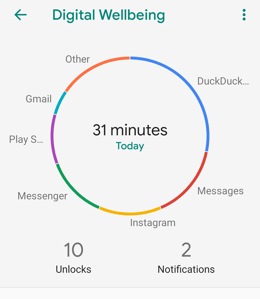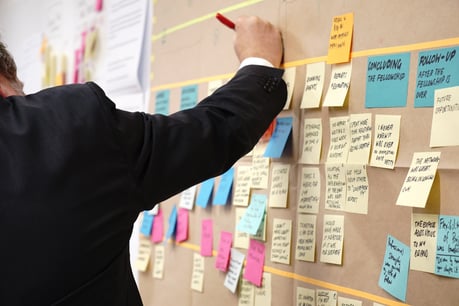Task management: two words that often conjure images of Excel spreadsheets, endless checkboxes, or even chore charts. Before we know it, we’re faced with a list as long as our arm — one that seemingly grows overnight.
But does it have to be that way?
In this blog, we'll look at strategies to optimize task (and, consequently, time) management for your student and family. Here are our tips for task management for cyber charter students and beyond.
Task management isn't just for CEOs and executives.
Being able to juggle multiple tasks is an important aspect of all school, career, and home duties. If we’re not careful with our scheduling, we might end up flying through meetings, classes, and activities, but not account for household tasks such as dishes, laundry, and yard work — or, on the really long days, an evening of watching cat videos on YouTube. (Author’s note: Videos are great, especially funny cat ones, but in moderation.)
Is there a happy medium?
Yes, there is!
How are task management and time management related?
Time management is an overall process of organizing how much time you spend on your activities and projects, or your tasks. Productivity specialist Mike Vardy notes that we become easily overwhelmed if we’re trying to manage time itself. By contrast, focusing on excellence in our individual tasks means that “you end up managing one thing at a time rather than something that is far greater in size — something that no one has ever really mastered a battle with.”
With this in mind, let’s turn our attention to some common problems, and find some potential solutions.
Task Management for Cyber Charter Students and Beyond
Problem 1: We have too many activities and tasks happening throughout the day for us to keep track of.
Prioritize, and be prepared to say no. This sounds harsh, and something that many people struggle with, but it’s easy to get lost in karate lessons, soccer practice, or even volunteer opportunities. Prioritization helps dictate what is collectively important, and influences your subsequent decisions.
For example, if the “task” of sitting down to a family dinner is an important bonding exercise in your household (quality time), then centering the evening around that is your priority.
Most of us prefer not to disappoint others, so we commit to activities that we may not want or need to do. Outside of family, work, school, and any religious commitments, most everything else is flexible.
Problem 2: Where do we even begin?
Start small with task management for cyber charter students and beyond. Don’t expect to create a master plan right away. Any planning that you can do in advance will alleviate some mental and emotional stress.
For a cyber charter student, for example, specific lists of the student’s tasks during class time and asynchronous independent work sessions provide a framework of expectations. Typically the teacher provides a class schedule or lesson plan that you can start with. Using a time tracking worksheet or app provides a more accurate picture of how long each task takes, which can be taken into account for future planning.
There are a plethora of task management websites, worksheets, and apps available that can help get you started. (More about that later!)
Problem 3: Life can change so quickly, so what's the point of all that planning when it's going to be altered?
Like most things, it’s about balance. Task management becomes particularly important as your child’s responsibilities increase throughout their time in school. The more independent control they have over their schedules, the more crucial it is that they implement task management.
Children typically learn task and time management from teachers and parents. For this reason, many students successfully navigated such management while attending in-person schooling, but struggled when the COVID-19 pandemic pushed programs into a virtual environment, according to Education Week. For families where one or both guardians held jobs, this proved particularly challenging.
Engaging your young student in the task management process teaches foundational skills that will be useful later in life. While it might seem that your kindergartener is only doing the tasks required in order to go to recess or play outside, they’re actually gaining valuable skills in resilience, independence, self-motivation, and goal setting.
Problem 4: My student struggles with staying motivated to get tasks done, and then either doesn't complete what is necessary, or rushes to finish at the last minute. Help!
It's important to note here that this is a challenge faced by people of all ages, so your child is not alone. Many adults face the same concern! Staying motivated is certainly a challenge, particularly with all the distractions at our fingertips.
There are several schools of thought regarding task completion, but some of the most prevalent are:
- To complete several smaller tasks first, so as to psych yourself up to achieve more; or
- To Eat the Frog, a productivity method that tackles your most difficult and important task first.
The completion of tasks can provide a small amount of mental and emotional breathing room — something all of us need more of.
But let's be realistic: sometimes our task list is sidelined by something urgent, and we have to adapt.
However, if your student is frequently finding themselves without motivation, rushing to finish tasks, or just giving up, then the first step is to identify what  is occupying their time. Most smartphones have digital tools that track your usage, or even let you set limits, such as Google’s Digital WellBeing app found on most Android phones.
is occupying their time. Most smartphones have digital tools that track your usage, or even let you set limits, such as Google’s Digital WellBeing app found on most Android phones.
Additionally, sites like RescueTime help monitor your productivity time and goals, while apps StayFree and Forest keep you focused and distraction free. Plus, for those who also want to make a difference, the longer you stay focused using Forest, the more trees you plant in its digital world — which can correlate to real-world tree planting by Trees for the Future. (Note: Some websites and apps have subscription fees, so check to see what works best for you.)
Problem 5: I don't know which tool is best!
Whichever helps you most! It’s a matter of what format fits your learning and work styles. Many popular digital tools stem from the Kanban Board concept, popularized by Toyota Motor Company, which uses sticky notes, charts, and other physical elements to visualize tasks, project management, and brainstorming sessions. As you move through the completion process, you move the tasks or concepts between different sections, or “swim lanes.” Now you can find this helpful method in a digital setting as well.

Some tools that may guide you on your path to an optimal task management system include:
Tactile:
- Bullet journaling
- Homemade task charts and cards
- Kanban Board
- Paper agendas and planners
- Asana
- Evernote
- Google Keep
- Slack
- Sticky Notes
- Todoist
- Trello
- Wunderlist
Is your cyber charter child struggling to balance their many requirements? Review some of our strategies for keeping them on task.
Photo credits to Glenn Carstens-Peters and Jo Szczepanska on Unsplash.




Comments